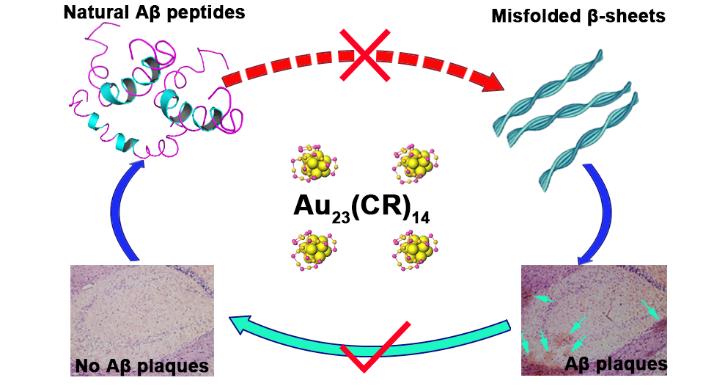
Credit: ©Science China Press
Alzheimer’s disease (AD) is a progressive neurodegenerative disorder characterized by amyloid-β (Aβ) fibrillation and plaque formation. While more than 50 millions of people are devastated by AD, no treatment is available. Recently, anti-Aβ antibody-based immunotherapy has failed in clinical trials, partially due to the increased cytotoxicity of soluble Aβ oligomers. Therefore, developing a medication for AD treatment becomes an even more grave challenge.
In a new research article published in the Beijing-based National Science Review, scientists at the State Key Laboratory of Advanced Technology for Materials Synthesis and Processing, Wuhan University of Technology in China explored the possibility of treating with gold nanoclusters.
As illustrated in Figure 1, Au23(CR)14, a novel gold nanocluster modified with Cys-Arg (CR) dipeptide, functions in multiple stages of the progression from Aβ monomer to Aβ plaques: inhibiting the misfolding and fibrillation of amyloid-β (Aβ), fully dissolving the preformed/mature Aβ fibrils and restoring the conformation of Aβ peptides from misfolded β-sheets into unfolded monomer state with abolished cytotoxicity, and more importantly, completely dissolving endogenous Aβ plaques in the brain slices from transgenic AD model mice. Furthermore, Au23(CR)14 has good biocompatibility and infiltration ability across the blood brain barrier (BBB).
This article not only presents a compelling nanotherapeutic candidate for AD treatment, but also opens a new frontier for developing nanomaterial-based medications for AD treatment. Undoubtedly, more researches studying the basic mechanisms by which gold nanoclusters dissolve Aβ plaques will spur the development of new medications for AD treatment.
###
This research received funding from the National Natural Science Foundation of China (21975191, 21805218, 51873168, 81803515, 51533007 and 51521001) and the Natural Science Foundation of Hubei Province (2018CFA002 and 2018CFB348).
See the article:
Wenkang Zhang, Guanbin Gao*, Zhongjie Ma, Zhuoying Luo, Meng He, and Taolei Sun*
Au23(CR)14 Nanocluster Restores Fibril Aβ’s Unfolded State with Abolished Cytotoxicity and Dissolves Endogenous Aβ Plaques
Natl Sci Rev Doi:10.1093/nsr/nwz215
https:/
The National Science Review is the first comprehensive scholarly journal released in English in China that is aimed at linking the country’s rapidly advancing community of scientists with the global frontiers of science and technology. The journal also aims to shine a worldwide spotlight on scientific research advances across China.
Media Contact
Taolei Sun
[email protected]
Related Journal Article
http://dx.




